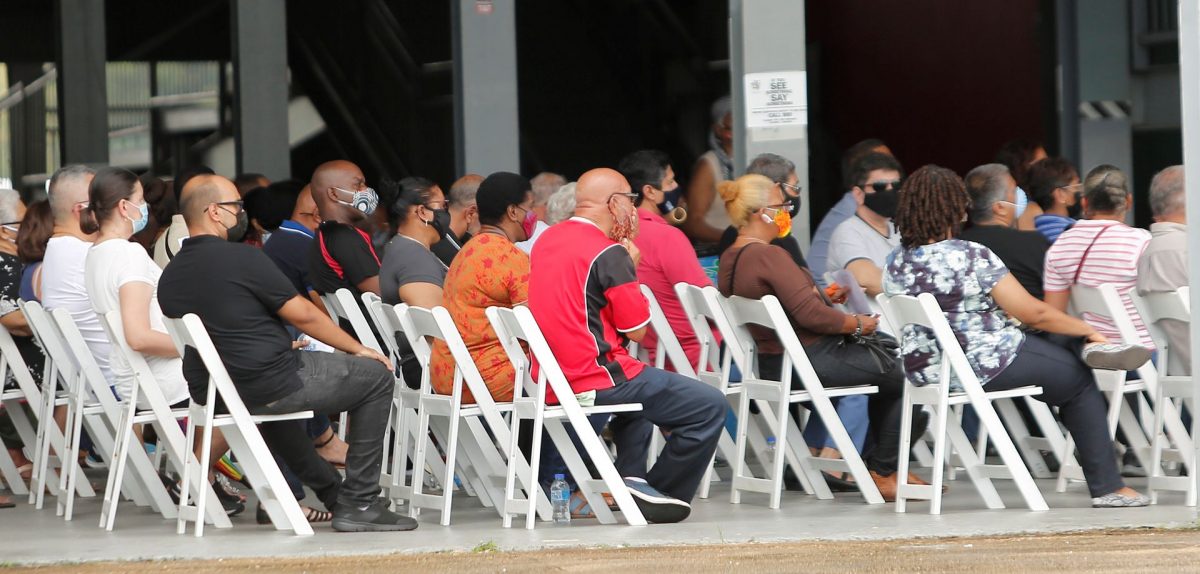(Trinidad Guardian) Prime Minister Keith Rowley has announced that the government has rolled back its decision to end the vaccination programme and instead will continue on using the remainder of the vaccines meant to be second doses for those who received their first jabs.
Speaking during a news conference in Scarborough, Tobago yesterday the Prime Minister said the government expects the second tranche of AstraZeneca vaccines being supplied through the COVAX facility to arrive in this country next month – May.
“We have confirmation that we are to expect another similar batch coming to us during the month of May. The Ministry of Health advised that they got documentation of that shipment.”
But he said the Italian embargo on the export of vaccines might affect the shipment, prompting the government to reverse a recently announced decision.
“In anticipation of getting that, I have today agreed with the Ministry of Health – the holding in our hands now our 38,000 doses of vaccines that we’re holding, in the event that no more were coming to us in the very near future and that would have been used to be the second dose, on those persons who were vaccinated – we have taken a decision today that we will use those vaccines as first dose application for persons who are to be vaccinated.”
He added, “What is the worst that can happen? The worse that can happen is that the second tranche does not get here. Its means that all 80,000 who were vaccinated, only got one dose. The worst-case scenario is that one dose is a lot better than no dose.”
The Prime Minister said scientific data indicated that one dose gives 65 per cent protection to the vaccinated person.
It was only this week, the Minister of Health announced the programme would be ending.
But Dr Rowley also explained that some bad news received earlier on Thursday prompted the decision to administer what would have been the second doses of the vaccine.
Dr Rowley said the anticipated release of some of the 60 million vaccines to this country and others by the United States, may not happen.
“This morning the news was that something happened in the United States in Baltimore, where the production of AstraZeneca was being done and when the statements were being made that the American Government is trying to ensure the safety of what will become available for distribution, the initial thought was that it had to do with the expiration date. What we discovered today is that the examination at the factory, where it is being produced, is that there were contaminations with vaccine one, with vaccine two.”
He said the government is awaiting confirmation on that issue.
The Prime Minister reiterated the scarcity of vaccines on the market, saying the COVAX mechanism available to Caribbean countries, did not receive its expected supply.
“As head of a Government, I can tell you we cannot buy a single vaccine in the world. The vaccines are in the possession of people who have decided that they will use it for themselves and only when they are satisfied that they have been vaccinated then they will look in our direction.”
However, the Prime Minister warned that the use of vaccines does not mean there should be complacency.
He explained that when the government rolled out its vaccination programme, people began to pay less attention to COVID-19 protocols and this may have resulted in the recent continued spike in new COVID cases.
Dr Rowley said he saw a change in behaviour once the vaccines arrived.
“I could tell you as a person who has been monitoring this daily, I saw the relaxation when the vaccines were authorized when vaccines started to be distributed, and even though the vaccines were available in small numbers, the general conversation, the general reaction of the population was to let our guard down.”
He added: “The vaccine season caused us to lose sight of the fact, that it’s (vaccine) is not a cure.”
The Prime Minister added that vaccines merely reduce the effects of COVID if persons become infected.






